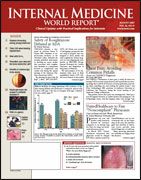Publication
Article
Internal Medicine World Report
The Oldest Old Get Suboptimal Care for ACS
Author(s):
By Bruce Sylvester
If you examine a patient older than 90 with a heart problem at the emergency department, tell everyone there to forget about that patient's age.
Although a new study shows that optimal emergency care for acute coronary syndrome (ACS) in the very elderly significantly increases their chances of survival—just as it does in younger patients—it also reveals that optimal care for ACS is often withheld from nonagenarians and centenarians (J Am Coll Cardiol. 2007;49:1790-1797).
"The oldest old patients, those aged 90 and greater, are less likely to receive aggressive antithrombotic therapy and early invasive risk stratification," investigator David Cohen, MD, director of cardiovascular research at Saint Luke's Mid America Heart Institute in Kansas City, Mo, told IMWR.
ACS is an "umbrella" diagnosis that includes non?ST-segment elevation myocardial infarction, unstable angina, and chest pain. It is usually caused by a temporary or partial blockage of the coronary artery.
Dr Cohen and colleagues retrospectively analyzed data from the CRUSADE (Can Rapid Risk Stratification of Unstable Angina Patients Suppress Adverse Outcomes with Early Implementation of the American College of Cardiology/American Heart Association Guidelines) National Quality Improvement Initiative, a national registry that includes nearly 52,000 patients aged ≥75 years who have been diagnosed with non?ST-segment elevation ACS. The registry includes >5500 patients aged ≥90 years.
Analysis showed that many treating physicians deemed cardiac catheterization inadvisable for about 60% of those ≥90 years, as compared with 27% of those aged 75 to 89 years. Age was the most frequently cited determining factor, but no clear rationale was found for denying such guideline-recommended treatment to the oldest age-groups.
The physicians' caution may have been related to concerns about treatment-related bleeding, the investigators note. In CRUSADE, the use of anticlotting medications and cardiac catheterization was shown to increase bleeding complication rates among patients older than age 90.
However, Dr Cohen emphasized that "despite their increased risk of complications, the use of aggressive medical therapy and invasive risk stratification/ revascularization were associated with a significant reduction in in-hospital mortality for the very elderly population."
Key Points
- Ignore the patient?s age when treating people presenting with chest pain, unstable angina, or non?ST-segment elevation myocardial infarction.
- Despite a greater potential for complications, evidence shows that aggressive and invasive therapies for these conditions in the very old significantly reduce mortality.
IMWR
In light of this new analysis, American Heart Association spokesperson Nieca Goldberg, MD, a cardiologist practicing in New York City and a nationally recognized pioneer in women's heart health, told , "It is important that we do not use age as a sole basis to hold back therapies, particularly in those individuals that are 90 and over. We should take care of the patient with lipid-lowering therapy, treatment for blood vessels, and appropriate lifestyle interventions."
Addressing concerns about treatment-associated bleeding, Dr Goldberg added, "Most important, we have to work on reducing the morbidity from bleeding, which increases with age," and which, he said, "may be associated with metabolic changes in drug metabolism in the elderly."





